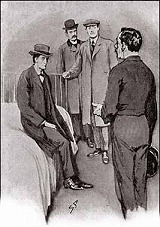“What did you do?” he asked.
“I wired to Cambridge to learn if anything had been heard of him there. I have had an answer. No one has seen him.”
“Could he have got back to Cambridge?”
“Yes, there is a late train - quarter-past eleven.”
“But, so far as you can ascertain, he did not take it?”
“No, he has not been seen.”
“What did you do next?”
“I wired to Lord Mount-James.”
“Why to Lord Mount-James?”
“Godfrey is an orphan, and Lord Mount-James is his nearest relative - his uncle, I believe.”
“Indeed. This throws new light upon the matter. Lord Mount-James is one of the richest men in England.”
“So I’ve heard Godfrey say.”
“And your friend was closely related?”
“Yes, he was his heir, and the old boy is nearly eighty - cram full of gout, too. They say he could chalk his billiard-cue with his knuckles. He never allowed Godfrey a shilling in his life, for he is an absolute miser, but it will all come to him right enough.”
“Have you heard from Lord Mount-James?”
“No.”
“What motive could your friend have in going to Lord Mount-James?”
“Well, something was worrying him the night before, and if it was to do with money it is possible that he would make for his nearest relative, who had so much of it, though from all I have heard he would not have much chance of getting it. Godfrey was not fond of the old man. He would not go if he could help it.”
“Well, we can soon determine that. If your friend was going to his relative, Lord Mount-James, you have then to explain the visit of this rough-looking fellow at so late an hour, and the agitation that was caused by his coming.”
Cyril Overton pressed his hands to his head. “I can make nothing of it, ” said he.
“Well, well, I have a clear day, and I shall be happy to look into the matter,” said Holmes. “I should strongly recommend you to make your preparations for your match without reference to this young gentleman. It must, as you say, have been an overpowering necessity which tore him away in such a fashion, and the same necessity is likely to hold him away. Let us step round together to the hotel, and see if the porter can throw any fresh light upon the matter.”
Sherlock Holmes was a past-master in the art of putting a humble witness at his ease, and very soon, in the privacy of Godfrey Staunton’s abandoned room, he had extracted all that the porter had to tell. The visitor of the night before was not a gentleman, neither was he a workingman. He was simply what the porter described as a “medium-looking chap,” a man of fifty, beard grizzled, pale face, quietly dressed. He seemed himself to be agitated. The porter had observed his hand trembling when he had held out the note. Godfrey Staunton had crammed the note into his pocket. Staunton had not shaken hands with the man in the hall. They had exchanged a few sentences, of which the porter had only distinguished the one word “time.” Then they had hurried off in the manner described. It was just half-past ten by the hall clock.
“Let me see,” said Holmes, seating himself on Staunton’s bed. “You are the day porter, are you not?”
“Yes, sir, I go off duty at eleven.”
“The night porter saw nothing, I suppose?”
“No, sir, one theatre party came in late. No one else.”
“Were you on duty all day yesterday?”
“Yes, sir.”

“Did you take any messages to Mr. Staunton?”
“Yes, sir, one telegram.”
“Ah! that’s interesting. What o’clock was this?”
“About six.”
“Where was Mr. Staunton when he received it?”
“Here in his room.”
“Were you present when he opened it?”